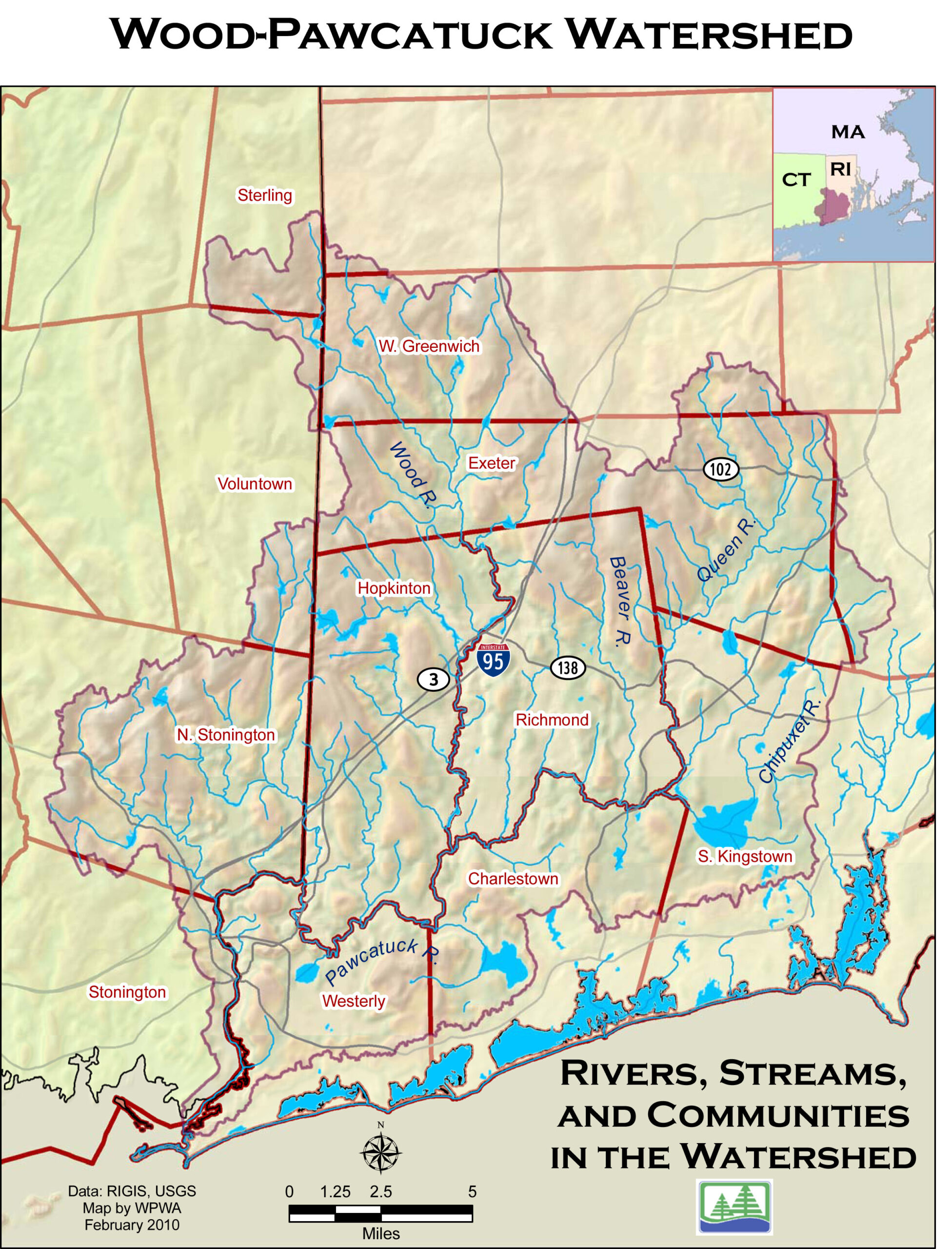Rivers keep on rolling
By Blake Rogers / ecoRI News contributor
 |
| Only 20 percent of the Wood-Pawcatuck watershed is developed. Along the upper Wood River, houses are few and far between. (Caitlin Faulds/ecoRI News) |
To celebrate the designation of the Wood-Pawcatuck watershed as a National Wild & Scenic River, the watershed association is planning the first 7 Rivers Festival in June.
The Wood-Pawcatuck watershed encompasses a 300-square-mile area of land in southwestern Rhode Island and southeastern Connecticut. Its seven major drainage basins include the Queen, Wood, Chickasheen, Chipuxet, Shunock, Green Falls, and Pawcatuck rivers and their tributaries.
The rivers in the watershed meander through 12 towns in two states: Charlestown, Exeter, Hopkinton, North Kingstown, Richmond, South Kingstown, West Greenwich and Westerly in Rhode Island, and North Stonington, Stonington, Sterling and Voluntown in Connecticut.
According to the Wood-Pawcatuck Watershed
Association (WPWA), it is one of the few remaining relatively
pristine natural areas along the northeast corridor between New York and
Boston.
The
Wood River — the largest of six tributaries that link up with the Pawcatuck
River to eventually spill into Little Narragansett Bay — is New England’s most
biodiverse river, according to a National Park Service (NPS) survey in the
early 1980s. The survey, in addition to pointing out the river’s attributes,
sparked interest in the watershed’s potential and set in motion a decades-long
drive toward preservation.
The WPWA is scheduled to hold festival events June 25-26 in locations in southwestern Rhode Island and southeastern Connecticut. Kassi Donnelly, the Wild & Scenic Rivers coordinator for the WPWA, said the goal is for participants “to enjoy a weekend of festivities and to share pride in our lands and waters. This national Wood-Pawcatuck Wild & Scenic Rivers designation is special. We have natural resources that are rare or unique on regional and national levels.”
Donnelly said many events will be held on the watershed’s 57 miles of river, including kayaking, canoeing and paddling.
The WPWA is planning to host educational talks during the festival, and the Rhode Island Canoe & Kayak Association, along with the Southern New England Paddlers, will host a river paddle.
The Audubon Society of Rhode Island will host a nature walk, and there will be fly-tying and fly-fishing activities hosted by the Rhode Island Department of Environmental Management.
The Avalonia Land Conservancy, South Kingstown Land Trust, Westerly
Land Trust, the Mushroom Hunting Foundation, Milltown Arts Association, and
public libraries in Exeter, Charlestown and West Greenwich, R.I., and
Stonington, Conn., are all planning events or activities as well.
The
mission of the WPWA, created in 1983, is “to preserve and protect the integrity
of the lands and waters of the Wood-Pawcatuck Watershed for the benefit of
natural and human communities.” The association deals with a wide range of
issues, including land use, surface and groundwater use, water quality, threats
to habitat, growth issues, and river corridor concerns.
After a nearly 10-year effort, the WPWA’s waterways were designated wild and scenic by the National Wild & Scenic Rivers System in 2019. Only 1% of the country’s 3.6 million miles of waterways have earned this designation, which is usually bestowed by Congress.
The federal guidelines state a river must contain
an aspect that has “outstandingly remarkable value” to be named a National Wild
& Scenic River. The designation, set out in the 1968 Wild and
Scenic Rivers Act, can bring in funding, draw on NPS resources and maintain the
free-flowing condition of the watershed’s rivers.
The
WPWA’s Donnelly said the association recently formed the Wood-Pawcatuck Wild
and Scenic Rivers Stewardship Council to prioritize projects that highlight the
value of the watershed. The council includes representatives from the 12
municipalities in the watershed, as well as the Narragansett Indian Tribe, Save
The Bay, the NPS, and Rhode Island and Connecticut environmental agencies,
according to Donnelly.
The
WPWA maintains a campus on the upper Woods River, at 203 Arcadia Road in Hope
Valley, where there is free access kayaks, paddleboards and canoes.
To
book an event for the 7 Rivers Festival, contact the WPWA at 401-539-9017
or email wildevents@wpwa.org.
